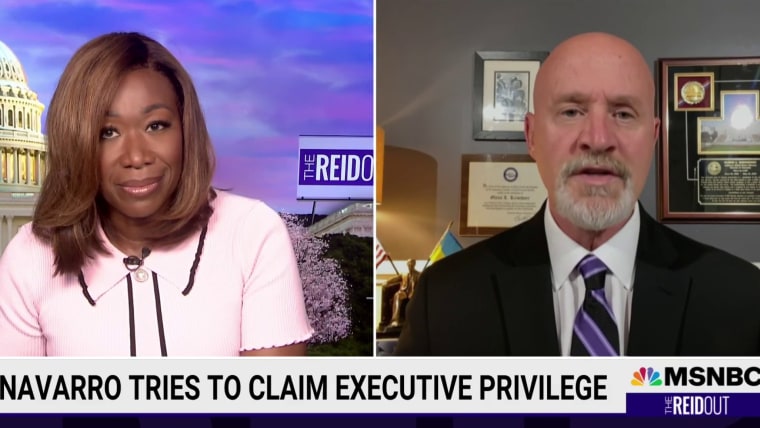A judge on Monday refused to grant former Trump White House adviser Peter Navarro’s request to force documents from the Justice Department in an attempt to stave off a federal prosecution. Navarro is a key figure in the House Jan. 6 committee's investigation.
The ruling is a major blow to Navarro, who was indicted in June by a federal grand jury on contempt of Congress charges for spurning a subpoena issued by the committee seeking his testimony and certain documents. He pleaded not guilty.
Navarro, one of the loudest and proudest proponents of then-President Donald Trump's efforts to overturn the 2020 election, argued in a court filing that he’s entitled to DOJ documents he says would support his claim of selective prosecution. Navarro's team argues that he shouldn't face prosecution because two other former Trump White House aides — Mark Meadows and Dan Scavino — weren't indicted despite refusing to testify before the Jan. 6 committee. Navarro claims he needs DOJ documents to prove he was unfairly targeted.
Navarro is undoubtedly a shady character, but I at least somewhat understand. In my view, Meadows and Scavino also deserve to be indicted on contempt of Congress charges.
But in striking down Navarro’s request, U.S. District Judge Amit Mehta let him know he's not in the same boat as Meadows and Scavino, from a legal perspective.
Mehta wrote that there are “valid differences between Meadows, Scavino, and Defendant that could have led to their different treatment.” The judge explained that Navarro “failed to meet his heavy burden” needed to justify a demand for the DOJ records.
According to Mehta, a key distinction between the three men is that Navarro — unlike Meadows and Scavino — never received formal instruction from Trump or his lawyers not to testify. Meadows and Scavino, however, were directed by Trump's legal team to invoke immunities or privileges that might allow them to avoid testifying.
Another distinction, Mehta said, was in the three men’s approaches to the committee. While Meadows’ and Scavino’s lawyers “engaged” and “negotiated” with the committee (and Meadows turned over some documents), Navarro “communicated with the Select Committee over a three-week period largely through terse emails and public statements,” Mehta said.
“He made no apparent effort to accommodate the Select Committee, let alone produce records as Meadows did,” the judge wrote.
Mehta left open the door that Navarro could theoretically come back with an argument for documents, but the ruling was clear that absent an unforeseen and incredibly rare scenario, his effort is dead in the water. And his criminal trial will likely continue as expected.
Still, Navarro's defense remained optimistic, telling The Washington Post in a statement: “Judge Mehta’s ruling lays out a clear framework for meeting that burden and we’re confident that as the evidence comes forward our next motion to compel will meet that burden.”
